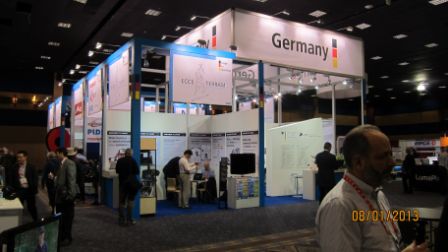
Again, after 2006 and 2008, the European Commission has launched a public consultation to revise EU copyright rules. The objective of this consultation is to gather input from all stakeholders on these rules. A review seems to be urgently needed, because both administration and industry have a common interest to benefit from a consolidated view about specific legal provisions and from some tightly focused amendments.
Besides the legitimate interest of companies for compliance, also several widely noticed reports show a certain need for action: among them are those of Pierre Lescure, a French media manager mandated by the Ministry of Culture to evaluate the possible future of levy systems, the recommendations of former EU commissioner António Vitorino or of Françoise Castex, member of the European parliament with the Socialist party, as well as contributions of French Minister Aurélie Filippetti..
1cc will thoroughly analyze the summary results of the public consultation, considering all stakeholder replies after publication. After a recent deadline extension for the sending of inputs until 5 March this will previously be in the course of March 2014.
On 11, Mrz 2014 | In News, WEEE | By Alisa Maier
EU Member States have to adopt national laws, regulations and administrative provisions necessary to comply with the new Directive 2012/19/EU of 4 July 2012 on waste electrical and electronic equipment (WEEE Recast Directive). The deadline for transposition was 14 February 2014. However, most Member States did not meet this deadline.
To date, only Bulgaria, Denmark, Luxembourg, the Netherlands and the UK have implemented the new WEEE Directive into national law. Several other countries have published draft legislation, as for example Austria, Croatia, France, Germany and Italy.
On 03, Mrz 2014 | In News, REACH | By Alisa Maier
On December 16, 2013, the European Chemicals Agency (ECHA) has included seven new substances in the REACH candidate list which now contains 151 substances. For the seven new and the previously identified candidate substances, information requirements according to REACH article 7 and 33 are obligatory:
If a candidate substance is present in an article in a concentration above 0,1 mass percent, suppliers of this article – manufacturer, importer or distributor- have to inform their direct customers. In addition, manufacturers and importers of articles have to notify ECHA about the substance according to article 7, if
- a candidate substance is present in the article above 0,1 mass percent, and
- the total amount of this substance in the article totals more than 1 ton/year, and
- the substance has not been registered at ECHA for that use.
If all three criteria are met, the manufacturer or importer has to submit a notification to ECHA within the following six months after the most recent update of the candidate list. For the above mentioned seven new candidate substances, the deadline is June 16, 2014.
Link to candidate list:
http://echa.europa.eu/de/candidate-list-table
Further substances are expected to be put on the list until summer. 22 substances out of this list are or will be subject to authorization as they have been added to REACH Annex XIV already.
On 28, Feb 2014 | In News, WEEE | By Alisa Maier
The German Stiftung ear has reclassified LED lamps. This type of lamps is no longer allocated to category 5a (glow-discharge lamps that can be used in private households), but to 5b (other lighting fixtures or devices for distributing or controlling light that can be used in private households).
Waste from lighting equipment is now collected together with small household equipment, tools etc. As a consequence, LED producers are responsible to participate in the recycling of a mix of e-waste which is much cheaper for them and where they have presumably lower market shares in terms of total weight. Moreover, parameters to determine the financial guarantee are also more favorable to the producers.

After years of negotiations and disputes, there are now Copyright Levies for PC in Germany. The rates are between 3,20 Euro and up to 13,20 Euro per unit, depending on the devices’ features, the use and the contractual situation of the vendor. Right now it may be most important to know, that these levies apply with retroactive effect as of 1 January 2011. In order to realize a 20% discount on the rates for the precedent years 2011-2013, each vendor is only allowed to sign the general agreement for the industry until 31 March 2014. For the future sales, so future reporting and billing periods, it is of course possible to contract at any time.
Furthermore, the binding agreement regarding copyright levies for PCs in Germany takes into account the ECJ Padawan/SGAE–judgement of 21 October 2010. This means that the professional use of PC is considered by significantly reduced rates and by ensuring the refund for vendors in the supply chain and for professional end users. The verification of professional use in the supply chain, however, will previously be a key task in the future.
The new tariffs shall apply until at least 2016 with the following rates:
| |
Contractual tariff
|
Non-contractual tariff
|
| Desktop-PC and Notebooks |
10.55 €
|
13.19 €
|
| Small PC (Netbooks) |
8.50 €
|
10.63 €
|
| Business-PC |
3.20 €
|
4.00 €
|
| Workstations |
3.20 €
|
4.00 €
|
Thus, the long dispute between industry and the German collecting society ZPÜ (Zentralstelle für private Überspielungsrechte) has made one step forward. At the same time it has to be underlined that this applies only to the period as of 2011, according to the revised (new) German Copyright Law. Claims, verdicts and proposals prior to 2007 as well as in the so-called transition period from 2008 until 2010 are not directly affected by this new agreement. For the period before 2011, there are still negotiations whether or not PCs are taxable at all, there are different industry positions (with separate agreements), diverse tariff proposals, discounts and arbitral verdicts.
1cc is always ready to support you with all necessary information and services.
„REACH und RoHS Update“ bei der IHK Stuttgart am 18. März 2014
Datum:
18. März 2014
Ort: IHK Stuttgart
1cc Beraterin Eva Hink gibt ein Update zu den gesetzlichen Anforderungen der EU-Chemikalienverordnung REACH und der EU-Richtlinie RoHS (Recast). Die Veranstaltung richtet sich sowohl an das produzierende Gewerbe als auch den Handel.
Uhrzeit: 9.00 Uhr bis 12.45 Uhr.
Weitere Informationen:
http://ausgabe.vstdbv3.ihk.de/vstdbv3/download?secid=%7B3DES%7D450C24BD922B92E5

This year 1cc was present with its own booth at CES in Las Vegas, accompanied by its partner TechProtect GmbH. The booth was part of the German industry representation, the German Pavilion at Las Vegas Hotel. It was intensely frequented by U.S., Asian and international trade show visitors and by the exhibitors of the Show, looking for advice in environmental and copyright legislation when exporting their products to the European markets. As CES is the world’s leading convention for consumer electronics and home appliances, most exhibitors and visitors have to deal with the numerous challenges set by particular issues of private copying levies, take-back of waste electric and electronic equipment and/or substance bans. Accordingly, the main topics of conversation were the current WEEE- and RoHS recasts and the highly controversial matter of copyright levies on TVs, Tablets, Mobile Phones and Hard Disks in Europe; this topic is by no means unknown in the United States, only the levies are not as high as in European countries and the overall scope is comparatively narrow.
1cc is looking back on four successful days at CES and is looking forward to new interesting projects with American companies. For further information on our consulting and compliance services contact
compliance@1cc-consulting.com.
 After years of negotiations and disputes, there are now Copyright Levies for PC in Germany. The rates are between 3,20 Euro and up to 13,20 Euro per unit, depending on the devices’ features, the use and the contractual situation of the vendor. Right now it may be most important to know, that these levies apply with retroactive effect as of 1 January 2011. In order to realize a 20% discount on the rates for the precedent years 2011-2013, each vendor is only allowed to sign the general agreement for the industry until 31 March 2014. For the future sales, so future reporting and billing periods, it is of course possible to contract at any time.
Furthermore, the binding agreement regarding copyright levies for PCs in Germany takes into account the ECJ Padawan/SGAE–judgement of 21 October 2010. This means that the professional use of PC is considered by significantly reduced rates and by ensuring the refund for vendors in the supply chain and for professional end users. The verification of professional use in the supply chain, however, will previously be a key task in the future.
The new tariffs shall apply until at least 2016 with the following rates:
After years of negotiations and disputes, there are now Copyright Levies for PC in Germany. The rates are between 3,20 Euro and up to 13,20 Euro per unit, depending on the devices’ features, the use and the contractual situation of the vendor. Right now it may be most important to know, that these levies apply with retroactive effect as of 1 January 2011. In order to realize a 20% discount on the rates for the precedent years 2011-2013, each vendor is only allowed to sign the general agreement for the industry until 31 March 2014. For the future sales, so future reporting and billing periods, it is of course possible to contract at any time.
Furthermore, the binding agreement regarding copyright levies for PCs in Germany takes into account the ECJ Padawan/SGAE–judgement of 21 October 2010. This means that the professional use of PC is considered by significantly reduced rates and by ensuring the refund for vendors in the supply chain and for professional end users. The verification of professional use in the supply chain, however, will previously be a key task in the future.
The new tariffs shall apply until at least 2016 with the following rates:




